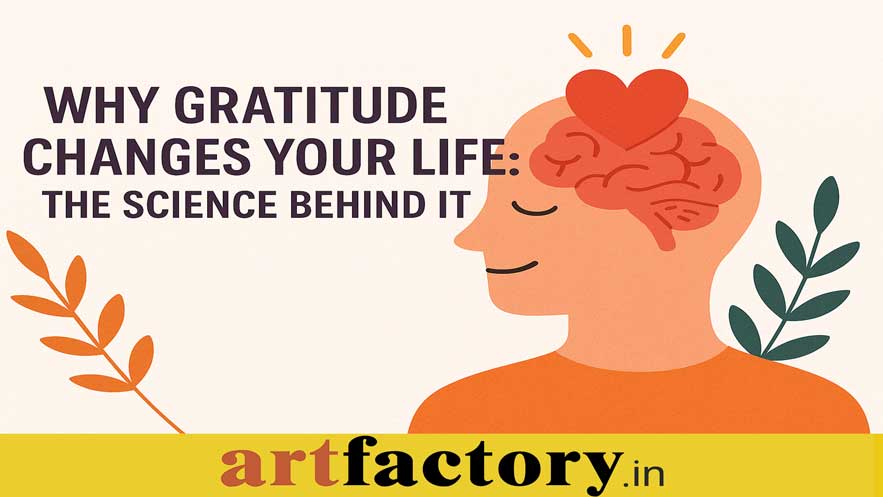
Why Gratitude Changes Your Life: The Science Behind It
Introduction: Gratitude Isn’t Just a Feeling — It’s a Life Changer
Gratitude is more than just saying "thank you." Scientific research proves that gratitude has the power to rewire your brain, elevate your mood, reduce stress, and improve your overall well-being. In a fast-paced, hyperconnected world, practicing gratitude is a simple yet powerful tool that can transform your life—mentally, emotionally, and even physically.
In this blog, we’ll explore the science behind gratitude, its impact on your brain and body, and simple ways to make gratitude a daily habit.
What Is Gratitude?
Gratitude is the positive emotional response that occurs when you recognize and appreciate the good in your life. It shifts your focus from what’s lacking to what’s already present. Whether you're grateful for a person, experience, or small moment, gratitude helps you center yourself in abundance rather than scarcity.
The Science Behind Gratitude: What Research Says
Let’s break down scientific studies that prove how gratitude changes your brain and life:
1. Gratitude Rewires Your Brain
Studies by neuroscientists show that practicing gratitude activates the brain's medial prefrontal cortex, associated with decision-making and emotional regulation. Repeated practice increases neural sensitivity to gratitude, making it easier to feel positive emotions over time.
Key Study:
A 2015 study published in Frontiers in Psychology found that individuals who wrote gratitude journals showed increased brain activity in the prefrontal cortex even months later.
2. Gratitude Improves Mental Health
Gratitude has been shown to reduce levels of cortisol, the stress hormone, and increase levels of dopamine and serotonin, the “feel-good” chemicals. People who practice gratitude consistently report:
Lower levels of anxiety and depression
Higher self-esteem
Improved sleep quality
Greater resilience during tough times
Key Study:
A 2003 study by Emmons & McCullough showed that participants who kept weekly gratitude journals reported higher levels of optimism and fewer health problems.
3. Gratitude Enhances Relationships
Whether it’s saying thank you to a loved one or expressing appreciation to a coworker, gratitude deepens bonds and fosters emotional connection. People who feel appreciated are more likely to show empathy, forgive, and maintain lasting relationships.
How Practicing Gratitude Daily Changes Your Life
Here's how gratitude transforms your daily life:
Shifts perspective from negativity to positivity
Reduces toxic emotions like envy, resentment, and regret
Boosts productivity and motivation by enhancing mood
Increases mindfulness and presence in the moment
Builds emotional resilience in the face of setbacks
7 Simple Gratitude Practices You Can Start Today
Incorporating gratitude into your life doesn’t require huge effort. Here are daily gratitude rituals you can adopt:
Gratitude Journal: Write 3 things you’re thankful for each morning.
Thank You Notes: Write a thank you message to someone every week.
Gratitude Walks: Reflect on your blessings while walking in nature.
Mirror Talk: Each morning, say something you’re grateful for aloud.
Gratitude Jar: Drop a note in a jar for each happy moment you experience.
Digital Detox: Disconnect and spend time reflecting on life’s simple joys.
Evening Reflection: End your day by recalling 3 good things that happened.
How Long Does It Take for Gratitude to Work?
According to scientific studies, practicing gratitude for just 21 days can create noticeable changes in your emotional health and mindset. The longer you practice, the deeper the benefits.
Gratitude and the Law of Attraction
Gratitude aligns closely with the Law of Attraction — the belief that positive thoughts bring positive outcomes. When you're grateful, you send out a high-vibration frequency that attracts more things to be grateful for.
Final Thoughts: Gratitude Is a Habit, Not a One-Time Act
Gratitude is like a muscle—the more you use it, the stronger it gets. Backed by science, gratitude has the ability to change your thoughts, shift your energy, and improve your life from the inside out. Start small, stay consistent, and watch how your life transforms.
FAQs About Gratitude
Q1. Can gratitude improve physical health?
Yes, studies show that grateful people experience fewer aches, better sleep, and stronger immunity.
Q2. What’s the best time to practice gratitude?
Morning or bedtime are ideal for reflection, but any time is beneficial.
Q3. Can gratitude help with anxiety and depression?
Absolutely. Gratitude increases feel-good hormones and reduces stress levels, supporting better mental health.

Comments : (0)